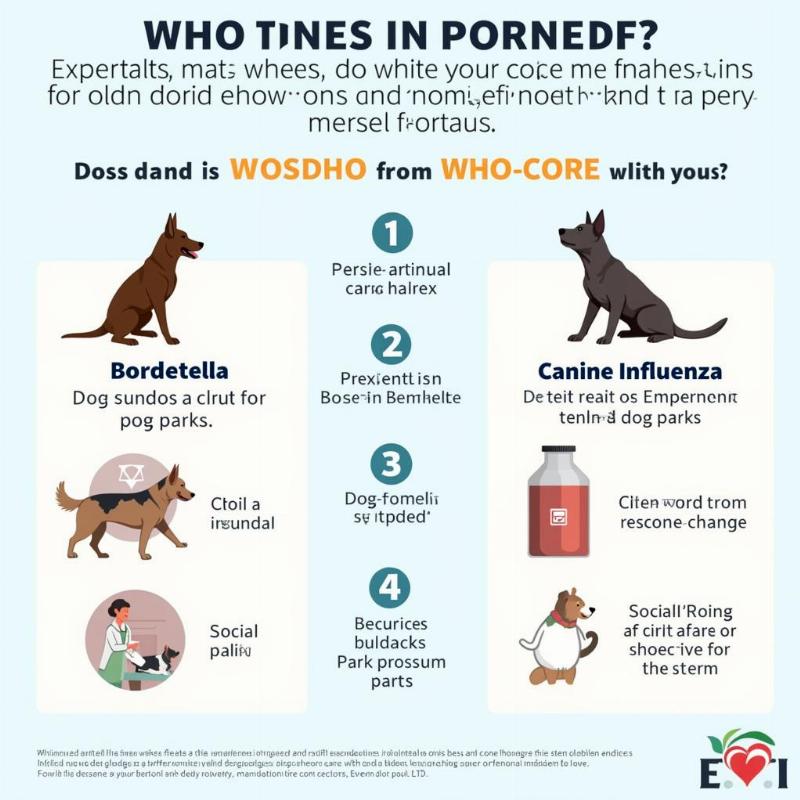Ensuring your furry friend is up-to-date on their vaccinations is crucial, especially when planning a trip that requires dog boarding. Knowing what shots are needed to board a dog not only protects your pet but also helps maintain a healthy environment for all the other dogs at the facility. This article will guide you through the essential vaccinations required by most boarding kennels in the US, helping you prepare for a stress-free boarding experience.
Essential Vaccinations for Dog Boarding
Most boarding facilities in the US require proof of certain core and non-core vaccinations to protect dogs from common canine diseases. While the specific requirements may vary slightly between kennels, understanding the standard vaccinations will ensure a smooth check-in process.
Core Vaccinations
Core vaccinations are considered vital for all dogs, regardless of lifestyle or environment. These protect against highly contagious and potentially life-threatening diseases.
-
Rabies: This is legally required in most states and is essential for protecting against rabies, a deadly viral disease that can be transmitted to humans.
-
Distemper: This combination vaccine, often referred to as DHPP or DA2PP, protects against distemper, hepatitis, parainfluenza, and parvovirus. These diseases can cause severe respiratory and gastrointestinal illness, especially in puppies.
-
Canine Parvovirus (Parvo): Highly contagious and particularly dangerous for puppies, parvovirus attacks the digestive system and can be fatal.
Non-Core Vaccinations: Protecting Your Dog in Social Environments
Non-core vaccinations are generally recommended for dogs that frequently interact with other dogs, such as in dog parks, grooming salons, or boarding facilities.
-
Bordetella bronchiseptica (Kennel Cough): Highly contagious, this respiratory infection can spread rapidly in close quarters like kennels. It causes a harsh, hacking cough and can lead to more serious respiratory problems.
-
Canine Influenza (Dog Flu): Like the human flu, the dog flu can cause respiratory illness and is easily transmitted between dogs in close contact.
 Non-core vaccinations for dogs
Non-core vaccinations for dogs
Understanding Vaccination Schedules and Titers
Puppies require a series of vaccinations starting at around 6-8 weeks of age, followed by boosters every few weeks until they are around 16 weeks old. Adult dogs typically require booster shots annually or every three years, depending on the vaccine.
Some boarding kennels may accept titer tests as an alternative to vaccination certificates. Titer tests measure the level of antibodies in a dog’s blood, indicating immunity to a specific disease. However, it’s essential to check with the boarding facility beforehand as not all kennels accept titers.
Planning Ahead for a Smooth Boarding Experience
Contact the boarding facility well in advance of your trip to inquire about their specific vaccination requirements. Provide them with your dog’s vaccination records or titer test results to ensure everything is in order. Remember, protecting your dog’s health is a top priority, and staying informed about necessary vaccinations ensures a happy and healthy boarding experience for your furry companion.
Conclusion
Ensuring your dog has the necessary vaccinations before boarding is not only crucial for their health but also a requirement for most boarding facilities. By understanding the core and non-core vaccinations and planning ahead, you can contribute to a safe and healthy environment for all dogs while enjoying peace of mind during your time away. Remember to always consult with your veterinarian to create a personalized vaccination plan for your beloved pet.
FAQ
-
How long do dog vaccines last? Most core vaccines last for at least a year, while some may provide immunity for up to three years. Non-core vaccines, like Bordetella, may require more frequent boosters.
-
Can my dog get sick even if they are vaccinated? While vaccines significantly reduce the risk, no vaccine is 100% effective. However, vaccinated dogs typically experience milder symptoms if they do contract a disease.
-
What if my dog has a reaction to a vaccine? While rare, vaccine reactions can occur. Contact your veterinarian immediately if you notice any unusual symptoms after vaccination.
-
Are there any exemptions to vaccination requirements? Some kennels may allow exemptions for dogs with certain medical conditions. Provide documentation from your veterinarian if this applies to your dog.
-
Do all boarding kennels require the same vaccinations? While most kennels require core vaccinations, requirements for non-core vaccines may vary. Always check with the specific facility.
-
Can I get my dog vaccinated right before boarding? It’s recommended to vaccinate your dog at least two weeks before boarding to allow their immune system to build up full protection.
-
Where can I find a reputable boarding kennel near me? Ask your veterinarian for recommendations or search online for accredited boarding facilities.
About Beautdogs.us
Beautdogs.us is your premier destination for all things dog-related in the US. We offer expert advice on dog breeds, grooming, nutrition, training, and overall wellness, providing a comprehensive resource for both new and experienced dog owners. Whether you’re looking for the perfect dog breed for your lifestyle, tips on training, or the latest information on dog health, Beautdogs.us has you covered. Contact us at [email protected] or +1 501-555-7529 for personalized guidance.